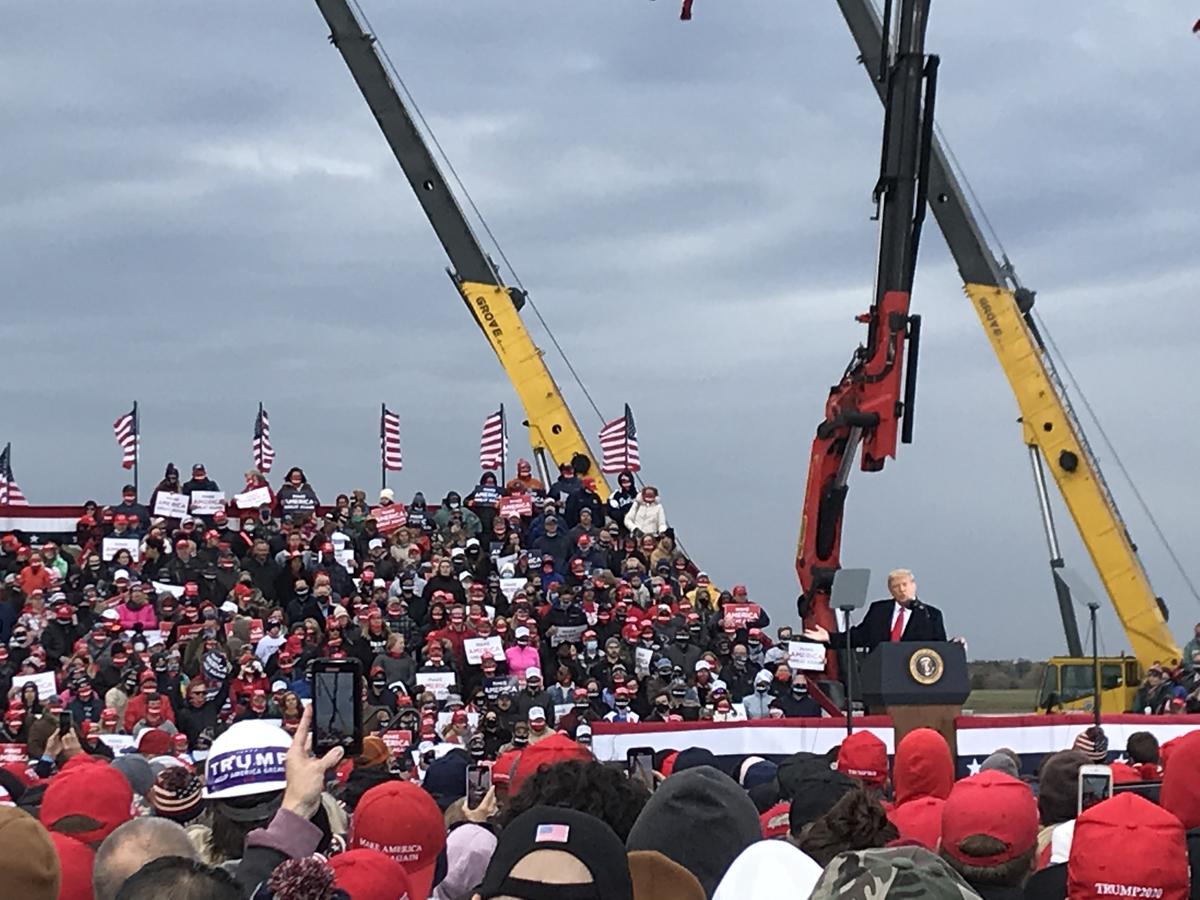
- Details
- By Native News Online Staff
MUSKEGON, Mich. — In the homelands of the People of the Three Fires, the Ojibwe, Ottawa and Potawatomi, President Donald Trump called those who want to replace Columbus Day with Indigenous Peoples’ Day “extremists.” Trump held a campaign rally in Muskegon, Mich. on Saturday afternoon.
His base of mostly Caucasian supporters loved what the president said and booed the idea of Indigenous Peoples’ Day.
His comments came at the end of Columbus Day was celebrated. His comments made in Muskegon echoed what the said a week earlier in his Columbus Day Proclamation when he also used the word extremists for those who want to replace Columbus Day with Indigenous Peoples’ Day.
"These extremists seek to replace discussion of his vast contributions with talk of failings, his discoveries with atrocities, and his achievements with transgressions. Rather than learn from our history, this radical ideology and its adherents seek to revise it, deprive it of any splendor, and mark it as inherently sinister," Trump said in Muskegon.
Trump went on to accuse former Vice President Joe Biden, the Democratic presidential nominee, of attacking Columbus by not mentioning the lost voyager in his Indigenous Peoples’ Day statement.
"So last week, Biden attacked Christopher Columbus by refusing to recognize Columbus Day. And he wants to change the name of Columbus Day to Indigenous Peoples Day. Who likes that idea?"
Biden wrote in part in his statement:
“Jill and I are proud to join with Native communities and all Americans to celebrate Indigenous People’s Day. Native Americans have always honored their deep connection to the land and kept faith with the rich spiritual traditions and heritage of their ancestors, often in the face of policies and violence that sought to strip them of both. With boundless resilience and strength, despite centuries of mistreatment and broken promises, Tribal Nations have fought to preserve their sovereign rights while also making countless contributions to strengthen the character of the United States — the famed American Indian Code Talkers who were critical to defeating facism in World War II, the activism and leadership of Native women, and so much more. It is a part of our history that every American must learn and respect.”
Trump stopped in Michigan for a brief stop. Michigan is a battleground state that Trump won in 2016 by 10,704 votes, a 0.23 percent margin.
Michigan is home to 12 federally recognized tribes and four state recognized American Indian tribes, with nearly 130,000 American Indians who reside statewide.
More Stories Like This
Native News Weekly (August 25, 2024): D.C. BriefsUS Presidents in Their Own Words Concerning American Indians
Montana County Redraws District After Settlement to Ensure Chippewa Cree Votes Count
Tunica-Biloxi Council Member Named to Tribal Leadership Foundation
Ethics Complaint Alleges Former Navajo Nation Chief of Staff Accepted Gifts From Contractor
Help us defend tribal sovereignty.
At Native News Online, our mission is rooted in telling the stories that strengthen sovereignty and uplift Indigenous voices — not just at year’s end, but every single day.
Because of your generosity last year, we were able to keep our reporters on the ground in tribal communities, at national gatherings and in the halls of Congress — covering the issues that matter most to Indian Country: sovereignty, culture, education, health and economic opportunity.
That support sustained us through a tough year in 2025. Now, as we look to the year ahead, we need your help right now to ensure warrior journalism remains strong — reporting that defends tribal sovereignty, amplifies Native truth, and holds power accountable.
 The stakes couldn't be higher. Your support keeps Native voices heard, Native stories told and Native sovereignty defended.
The stakes couldn't be higher. Your support keeps Native voices heard, Native stories told and Native sovereignty defended.
Stand with Warrior Journalism today.
Levi Rickert (Potawatomi), Editor & Publisher

